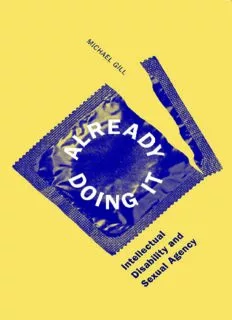Table Of ContentAlready Doing It
This page intentionally left blank
AlreAdy doing it
Intellectual Disability
and Sexual Agency
MIchAel GIll
University of Minnesota Press
Minneapolis / London
The University of Minnesota Press gratefully acknowledges financial assistance for
the publication of this book from the Committee for Support of Faculty Scholarship
at Grinnell College.
An earlier version of chapter 1 was published as “Rethinking Sexual Abuse,
Questions of Consent, and Intellectual Disability,” Sexuality Research and Social
Policy 7, no. 3 (2010): 201– 13; reprinted by permission of Springer. A portion of chap-
ter 2 appeared as “Sex Education and Young Adults with Intellectual Disabilities:
Crisis Response, Sexual Diversity, and Pleasure,” in The Myth of the Normal Curve,
ed. Curt Dudley- Marling and Alex Gurn, 171– 86 (New York: Peter Lang, 2010);
reprinted with permission of Peter Lang Inter national Academic Publishers. An
earlier version of chapter 3 was published as “Sex Can Wait, Masturbate: The Politics
of Masturbation Training,” Sexualities 15, nos. 3– 4 (2012): 472– 93; reprinted with
permission of Sage Publications, Ltd. An earlier version of chapter 7 was published
as “The Specials Meet the Lady Boys of Bangkok: Sexual and Gender Transgression,
and Smashing Intellectual Disability,” The Review of Education, Pedagogy, and
Cultural Studies 34, nos. 3– 4 (2012): 156– 69; reprinted by permission of Taylor &
Francis Ltd.
Copyright 2015 by the Regents of the University of Minnesota
All rights reserved. No part of this publication may be reproduced, stored
in a retrieval system, or transmitted, in any form or by any means, electronic,
mechanical, photocopying, recording, or otherwise, without the prior written
permission of the publisher.
Published by the University of Minnesota Press
111 Third Avenue South, Suite 290
Minneapolis, MN 55401- 2520
http://www.upress.umn.edu
Library of Congress Cataloging-in-Publication Data
Gill, Michael Carl.
Already doing it : intellectual disability and sexual agency / Michael Gill.
Includes bibliographical references and index.
ISBN 978-0-8166-8297-3 (hc: alk. paper) — ISBN 978-0-8166-8298-0 (pb:
alk. paper)
I. Title.
[DNLM: 1. Intellectual Disability. 2. Sexuality. 3. Education of Intellectually
Disabled. 4. Sex Education. 5. Sex Offenses. WM 307.S3] RC570
362.3—dc23
2014019915
Printed in the United States of America on acid- free paper
The University of Minnesota is an equal- opportunity educator and employer.
21 20 19 18 17 16 15 10 9 8 7 6 5 4 3 2 1
For 은정
This page intentionally left blank
Contents
Preface: Violations of Sexual life ix
Introduction: Sexual Ableism exposed 1
1 Questions of consent:
Rethinking competence and Sexual Abuse 23
2 Pleasure Principles:
From harm Reduction to Diversity in Sex education 47
3 Sex can Wait, Masturbate:
The Politics of Masturbation Training 83
4 Reproductive Intrusions:
The Fight against Forced Sterilization 105
5 Not Just an Able- Bodied Privilege:
Toward an ethics of Parenting 125
6 Screening Sexuality:
Media Representations of Intellectual Disability 145
7 Smashing Disability:
Sexual Transgression and the lady Boys of Bangkok 173
conclusion: Dismantling Ableist Assumptions 191
Acknowledgments 195
Notes 199
Index 249
This page intentionally left blank
Preface
Violations of Sexual life
This project began out of personal experience. Early on in my graduate
education in disability studies, one of my professors asked the stu-
dents in her class about our earliest memory of disability. Immediately,
I thought back to my then- recent work at a sheltered workshop for
people with developmental and intellectual disabilities.1 Prior to en-
tering graduate school, I provided vocational support in Spokane
County, Washington. I replied to the professor’s inquiry with a ster-
ile and rehearsed answer, something about my experience working as
a job coach and support staff member. It was not until the bus ride
home after class that I recalled previous encounters with disability—
encounters that escaped me only moments earlier.
When I was six or seven years old, I was at the Spokane Interstate
Fair with my parents and siblings. In between the countless carnival
rides and livestock animal exhibits, our family decided to take a din-
ner break. The fair was crowded and seating limited. After getting
our meals, we decided to join another family— a mother, father, and
daughter— at an open picnic table. As we sat down to eat, I was fo-
cused solely on my hot dog and fried cheese. But after a few minutes,
I began to take notice of the other family. The daughter, who wasn’t
much older than I was, was being fed by her mother. As she ate, some
of her food escaped her mouth and ran down her face and onto the
bib draped around her neck. For some reason it was difficult for her
to keep the entire contents of each bite of food in her mouth. My cu-
riosity and fear were ignited; I could not keep my eyes off the family.
Even my prized hot dog had lost its appeal. Sensing my fascination and
abjection at what I was witnessing, my parents quickly gathered us up
and left the table. Only looking back on the experience as an adult was I
able to realize that my staring and othering of this girl and her parents
was a result of my own learned fear of difference and disability. The
ix

